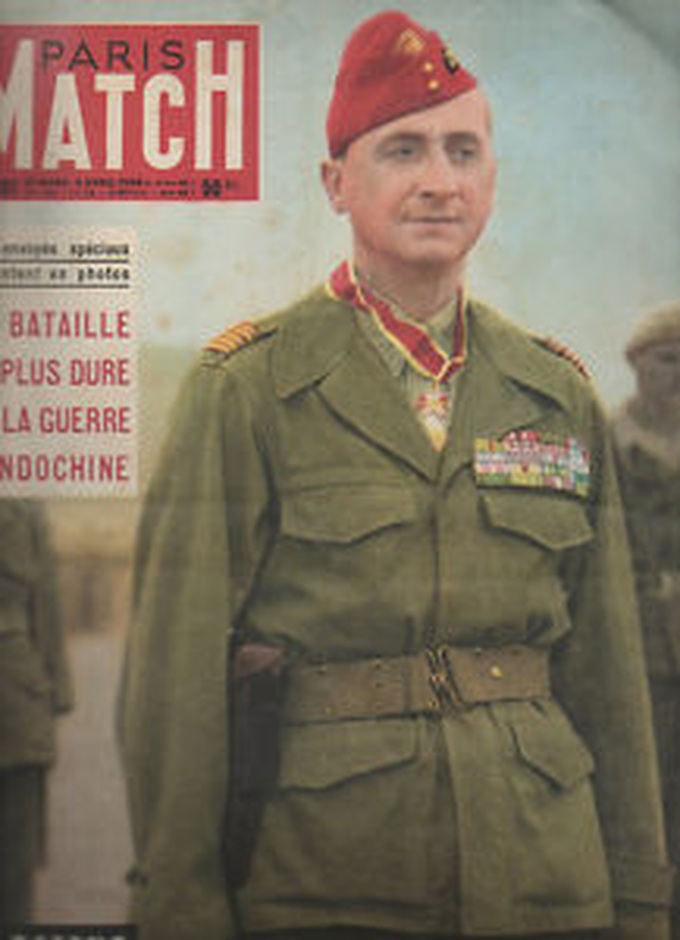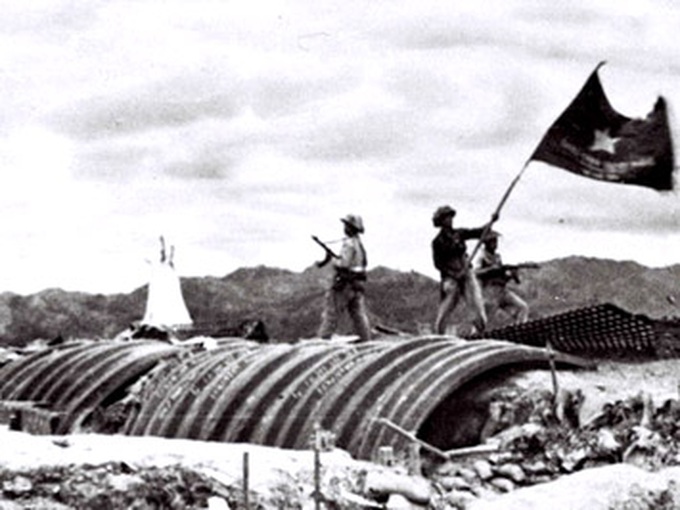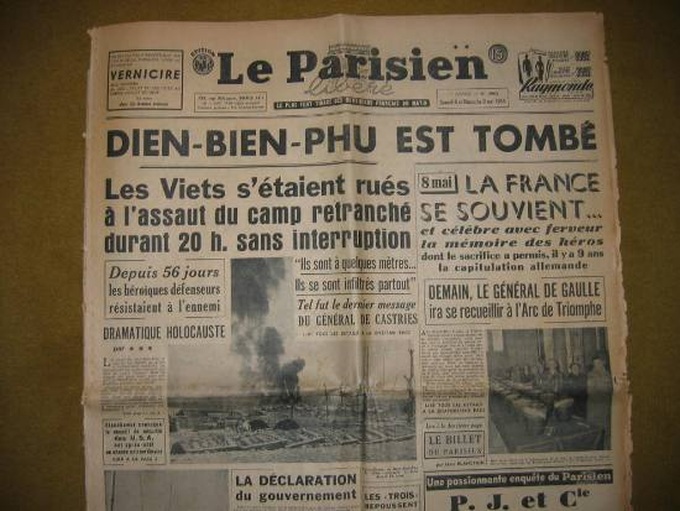The Viet Minh’s final phase in the battle included the assaults against the French central positions at Dien Bien Phu. The two central outposts (Eliane 1 to 7 and Dominique 1 to 6), were under the control of five culturally mixed battalions – French-born, Foreign Legion, Vietnamese colonial, Africans, and Thais.
 |
| Christian de Castries, French Commander-in-chief at Dien Bien Phu |
On the same day, the Viet Minh’s Division 316 under Colonel Le Quang Ba, captured Eliane 1 and part of Eliane 2. On the west of Dien Bien Phu, Division 308 attacked Huguette 7 but failed to take it. Shortly after midnight on March 31, the French launched a counterattack and recaptured Eliane 2 and Dominique 2. Viet Minh troops suffered heavy losses on all fronts.
The resistance of Eliane 2 (known to the Vietnamese as hill A1) presented a huge obstacle for Viet Minh troops and a big headache for Vo Nguyen Giap. Feeling distressed, he also feared that his troops would lose morale. He then fell ill and stayed in bed for several days, while thinking of new tactics to overcome the French at Eliane 2. On April 5, Giap decided to change his strategy and employed trench warfare. This was to reduce casualties for his troops from small arms fire and to slowly wear out the enemy.
By April 11, the Viet Minh entrenchments entirely surrounded Huguette 1 and Huguette 6. Desperate for water and ammunition as parachute supplies were hampered, Claudine, a central outpost, came to the rescue. They fought with the Viet Minh for three consecutive nights, April 15, 16, and 17. The French had some success at Huguette 6 but in the end Colonel Langlais decided to abandon this outpost.
On April 22, the Viet Minh took Huguette 1 and took control of most of the air strip. On the plain, the French had ten army tanks but couldn’t mobilize them through the muddy fields. Thick bushes also entangled the armored vehicles. It was the monsoon season and the combination of bombardment and flooding had turned the terrain into swamps, now filled with corpses and debris.
The battle of the five hills to gain final control of central Dien Bien Phu continued until May 6, with severe casualties on both sides.
Many weeks before, the Viet Minh had discovered an underground tunnel going from Eliane 2 through Eliane 3, and reaching Nam Rom River. Dien Bien Phu had become a French stronghold years earlier, with the construction of this tunnel as an escape route. Giap ordered his troops to dig a tunnel crossing the French tunnel, separating the two outposts above. They also dug another tunnel below General De Castries’ bunker. The group of 25 men and women had to cut into solid rocks manually, little by little. Without oxygen inside the earthen walls, they couldn’t use torches during the first phase of tunnel work. Some died from lack of oxygen. Several were killed by air raids. Despite all hardship, they completed the two tunnels at the beginning of May.
The morning of May 6, under clear sky, the French bombed the Viet Minh’s controlled areas, mobilizing all its airpower available on site - with 47 B26 bombers, 18 Corsairs, 26 Bearcats, 16 Helivers and 5 Privateers.
In retaliation, the Viet Minh unleashed all their weapons. The impact was like an earthquake. The entire French garrison was shaken by a series of explosion. French bunkers collapsed and trenches were flattened. The entire Dien Bien Phu camp was in flames.
During the day on May 6, the Viet Minh had transported one ton of TNT in a mine shaft into the tunnel below Eliane 2 and set its timer. At 8:30 pm, a very loud explosion shook the center of Dien Bien Phu and completely destroyed Eliane 2. This was the last centre of French resistance.
Viet Minh soldiers celebrated the victory with the following song:
We are happily reunited underground and over the forestAs we have the color of green leaves
Our hearts are overwhelmed by the immense sky
Humanity’s glorious day will be our glorious victory
And for our people, there will be no more pain and misery
I salute Dien Bien Phu and all of you, men and women of brain and bravery
As we are tightening the enemy with a steel belt
We, the fervent soldiers, in defiance of gunfire, bombs and napalm
And you, the barbarous aggressors, you will be defeated
Our ploughshares destroy your blockhouses and barbed wires
Flashes of shells lighting up the sky, our artillery
Roaring like thunder, and merging with our songs,
Songs of the suppressed people
Not long from now, an everlasting spring smile of the liberated people
Will be shining over these barren hills….
The next morning, a Viet Minh flag was flying over General Christian de Castries’ bunker at the center of Dien Bien Phu.




Viet Minh waving their flag above De Castries’ bunker (May 7, 1954)
Colonel Tran Do, Colonel Hoang Cam, and the commander of Viet Minh artillery, Colonel Le Trong Tan, were all present during the capture of General De Castries in the afternoon of May 7. Talking on the phone from the headquarters, General Giap wanted a proof that it was De Castries. The French general was asked to sign his name on a piece of paper and this was compared with his signatures on other documents in his bunker. They also checked his face with those in photos. De Castries addressed the Viet Minh commanders as “generals”. When asked about his own view concerning the battle, he shuddered, then quickly glanced at others who were in the bunker. He let out a sight before speaking.
He spoke with a humble voice, “ You generals allow me to have this conversation, I am delighted. For me, being a general, to discuss the battle with other generals is a great honor.” De Castries stopped and asked for a cigarette before expressing his opinion about the entire Dien Bien Phu campaign.
De Castries admitted the failure of the French strategy, “ You are superior fighters. Every time I tried to respond to your tactics, you had already adopted different ones. You always surprised us. We couldn’t predict your attacks – day or night. Sometimes we had artillery reinforcements. Sometimes we didn’t… Your soldiers are small men. But when they burst into my bunker, their faces were red, with eyes rolled up. It was terrifying.” Everyone let out a laugh.
Colonel Tran Do responded, “Our red faces were not caused by alcohol but by our deep anger and hatred. We resented the fact that you had come here to take over our country. All of that was stronger than any affect of alcohol.”

French news on the fall of Dien Bien Phu (May 9, 1954)
After a long silence, De Castries asked, “ Now, where are you going to take me to?”
Tran Do answered, “We’re bringing you to our superiors, then to a prison camp.”
De Castries’ eyes were opened widely, “Ah! Am I going to meet General Giap?”
Tran Do was impatient, “Just go! You don’t need to know at this moment.”
De Castries glanced at his two black subordinates, “Can they come with me too?”
Tran Do explained to De Castries that he and the other two men would be treated as prisoners and ranking would not matter.
Meanwhile, white flags were flying all over the battlefield. The French had surrendered.
Viet Nam was liberated from a century of France’s domination.
